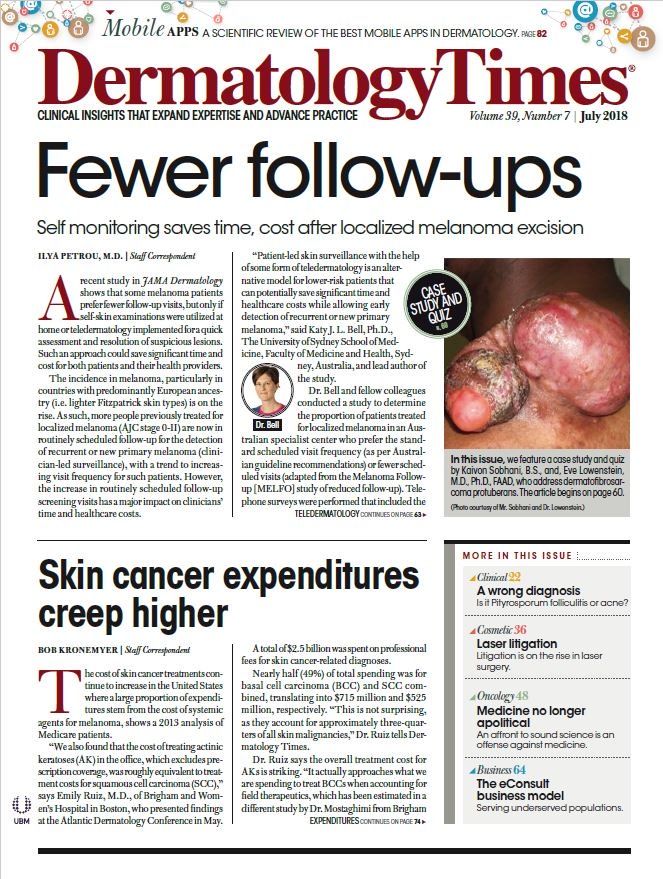- Case-Based Roundtable
- General Dermatology
- Eczema
- Chronic Hand Eczema
- Alopecia
- Aesthetics
- Vitiligo
- COVID-19
- Actinic Keratosis
- Precision Medicine and Biologics
- Rare Disease
- Wound Care
- Rosacea
- Psoriasis
- Psoriatic Arthritis
- Atopic Dermatitis
- Melasma
- NP and PA
- Skin Cancer
- Hidradenitis Suppurativa
- Drug Watch
- Pigmentary Disorders
- Acne
- Pediatric Dermatology
- Practice Management
- Prurigo Nodularis
- Buy-and-Bill
Publication
Article
Dermatology Times
Medicine no longer apolitical
Author(s):
Physicians writing in the Journal of the American Academy of Dermatology say that physicians should counter the proliferation of fake news on climate change.
(SoloviovaLiudmylaShutterstock.com)

Saami Khalifian, M.D.

Physicians writing in the Journal of the American Academy of Dermatology say that physicians should counter the proliferation of fake news on climate change.
“There is a trend to delegitimize facts which is most evident today with climate change,” said Saami Khalifian, M.D., a clinical fellow in dermatology at Massachusetts General Hospital who wrote the article with Misha Rosenbach, M.D., associate professor of dermatology at The Hospital of The University of Pennsylvania.
Publishing original research as a resident “is almost a prerequisite,” Dr. Khalifian said in an interview with Dermatology Times. “So, as physician scientists, the credibility of scientific discovery and discourse is paramount. However, once we lose agreement on what constitutes facts or real scientific discoveries or breakthroughs, that discourse breaks down.”
More than 95% of climate scientists agree that climate change is due to anthropomorphic causes, he said. “Yet there is still a significant subset of the population that is unsure that climate change really exists. I believe this creates a disconnect,” he said.
Fake news is threatening the concept and credibility of any kind of expertise and the credibility of any type of scientific research. “Therefore, it is important that dermatologists stand up for the integrity of science and scientific research,” Dr. Khalifian said.
In the past, scientists and physicians strived to remain apolitical, but being apolitical today may be a disservice to the profession, to the institution of science and to patients, he said.
“While the issue of climate change is poignant and contemporaneous, it is also one of the most polarizing issues, which is surprising because it should not be. This is not a Democrat or a Republication issue. This is a humanitarian issue that should not be fought along party lines,” Dr. Khalifian said.
Dr. Khalifian cites a 2015 paper from the Proceedings of the National Academy of Sciences that evaluated the role climate change has played in the ongoing Syrian Civil War.
“In Syria, there is evidence that the worst drought ever recorded, from 2007 to 2010, caused widespread food insecurity through failed harvests and subsequently forced the migration of farming communities to urban centers throughout the country. These mass migrations further catalyzed political turmoil in a country with limited infrastructure, unstable agricultural economy and rising authoritarian rule,” he said.
Studies have shown that the Syrian drought was far outside of the normal variability of temperature, rainfall and sea-level pressure. “This extreme, warm, dry weather was likely a result of anthropogenic climate change, as demonstrated by model studies of carbon emissions in the region leading to an unusually severe and protracted weather pattern that exacerbated ongoing political unrest in the region,” he said.
A 2017 article in the Journal of the American Academy of Dermatology elucidates the effect of climate change on skin disease in North America. “As the earth becomes warmer it creates an environment in which infectious vectors are able to travel further and longer in different seasons. These infectious vectors are also entering into places where they do not normally occur,” Dr. Khalifian said.
In addition to supporting science, dermatologists can demonstrate their concern for the environment in clinic by using energy-efficient lightbulbs, eliminating the use of styrofoam and single-use products, recycle, conserve water and turn lights off when not in use. And, contract energy companies that utilize renewable-energy sources.
In treating patients, they can adopt information sharing practices with patients. For example, in treating patients with tick bites, they can explain why it may be unusual to encounter lyme disease in hemispheres not previously associated with a proliferation of disease carrying deer ticks.
In recruiting new physicians or residents, Dr. Khalifian suggests employing a telemedicine-like approach by conducting virtual interviews. Instead of attending medical conferences in person, when possible, consider sitting in on conference webcasts.
Dr. Khalifian’s hope is that dermatology will lead the way for all other medical specialties to become involved in improving the environment and supporting the Paris climate accord.
Dr. Rosenbach and colleagues have started a focus group within the American Academy of Dermatology to implement environmentally-friendly changes within their specialty. “I would encourage all dermatologists to participate in this group. The time for intervention is now,” Dr. Khalifian said.
“If we don’t fight the fight, who will?” Dr. Khalifian says. “The notion that we are stewards of the public trust is something we should and do take very seriously â not only in how we practice medicine, but how we shape perception, how we counsel and how we encourage people to live healthier lifestyles.”
REFERENCES
Saami Khalifian, M.D., and Misha Rosenbach, M.D. “Dermatology and Climate Change.” Journal of the American Academy of Dermatology. Feb. 27, 2018. DOI:10.1016/j.jaad.2018.02.054.
Kelly CP, Mohtadi S, Cane MA, et al. “Climate Change in the Fertile Crescent and Implications of the Recent Syrian Drought.” Proceedings of the National Academy of Sciences. 2015:112(11):3241-6.
Kaffenberger BH, Shetlar D, Norton SA, et al. “The Effect of Climate Change on Skin Disease in North America.” Journal of the American Academy of Dermatology.DOI: 10.1016/j.jaad.2016.08.014.







